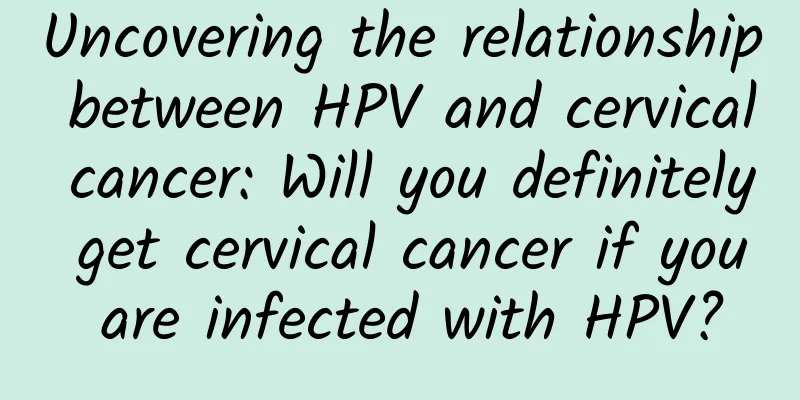Uncovering the relationship between HPV and cervical cancer: Will you definitely get cervical cancer if you are infected with HPV?

|
In the past two years, cervical cancer has been mentioned more and more frequently, which means that many people have heard of it but do not actually understand this disease. Some people even have some misunderstandings about cervical cancer based on hearsay, thinking that as long as they are infected with HPV, they will get cervical cancer. Is this really the case? Actually, this is not the case. There are many causes of cervical cancer, and HPV infection is only one of the most important causes, but not the only one. In addition, even if you are infected with HPV, it does not mean that you will definitely get cervical cancer . In fact, HPV infection is very common in the general population, with the infection rate among normal women ranging from 20-46%[1]. Only a small number of people develop malignant tumors, and for most people, the infection disappears within 2 years[2]. This is because our bodies have their own immune system. Of course, in those few people, the development from HPV infection to cervical cancer is not a one-time process, but a gradual evolution process, which generally takes 10-25 years. This stage is usually called the precancerous lesion stage, or cervical atypical hyperplasia. If precancerous lesions can be detected and treated early, and the potential risk of progression to cervical cancer can be blocked, the occurrence of cervical cancer can be effectively prevented and controlled . Generally speaking, early identification, treatment, and follow-up of cervical precancerous lesions through cervical cancer cell testing (TCT) can significantly reduce the incidence of invasive cervical cancer. Detecting the load of HPV in the body is conducive to the screening of cervical precancerous lesions and follow-up after treatment [3]. Of course, if you are unlucky, it is possible that it will develop into cervical cancer. The symptoms of cervical cancer are mainly manifested in three aspects: vaginal bleeding, vaginal discharge and late symptoms [4]. Vaginal bleeding often manifests as contact bleeding, that is, vaginal bleeding after sexual intercourse or gynecological examination. It can also manifest as irregular vaginal bleeding, or prolonged menstruation and increased menstrual flow. Elderly patients often have irregular vaginal bleeding after menopause. The amount of bleeding varies depending on the size of the lesion and the invasion of blood vessels in the interstitium. If large blood vessels are eroded, it can cause heavy bleeding. In terms of vaginal discharge , most patients have white or bloody, thin, watery or rice-like, and fishy-smelling vaginal discharge. In the late stage, patients may have a large amount of rice-like or purulent leucorrhea due to necrosis of cancerous tissue and infection. In the late stage , patients will have different secondary symptoms according to the extent of cancer involvement, such as frequent urination, urgency, constipation, lower limb swelling and pain, etc. When the cancer compresses or involves the ureter, it can cause ureteral obstruction, hydronephrosis and uremia; in the late stage, there are symptoms of systemic failure such as anemia and cachexia. I believe that through the above description, everyone has a little knowledge about cervical cancer. If you don't want cervical cancer to happen to you, female friends must do HPV screening regularly. Once you suspect that there is a possibility of lesions, please go to a regular hospital for diagnosis and treatment in time. References: [1] Zhang Donghong, Lin Meishan. Meta-analysis of human papillomavirus infection and genotype characteristics in Chinese cervical lesions. Chinese Journal of General Practice, 2010, 13(12): 1287-1290. [2] Qin Fei, Che Jinlian, Xue Yuanling, et al. Application of MRI in the diagnosis and staging of cervical cancer[J]. Journal of Guangxi Medical University, 2013, 30(2): 258-260. [3] Ma Liangkun. Human papillomavirus (HPV) infection and cervical precancerous lesions[J]. Chinese Community Physician: Medical Specialty, 2010(5):1. [4] Xie Xing, Gou Wenli. Obstetrics and Gynecology, 8th edition, People's Medical Publishing House, 2013, P306. |
<<: What are the dangers of vascular aging?
>>: When your skin itches, do you just scratch it?
Recommend
What should I do if I have cervical erosion and polyps?
Cervical erosion troubles many female friends, so...
Where is Dahongpao pepper produced? What are the characteristics of Dahongpao pepper?
Dahongpao pepper has the best quality and is deep...
Numbness in hands and feet after childbirth
After giving birth, a woman's body is in a ve...
What kind of mushrooms are used for deep-fried mushrooms?
Mushrooms are a common type of fungus food. They ...
What to do if a girl has yeast infection
There are many types of gynecological diseases in...
Techinsights: China's smartphone market shipments reached 67.4 million units in Q2 2024, a year-on-year increase of 5%
Techinsights recently released a domestic smartph...
Can I eat bananas during menstruation?
Every woman knows that during menstruation, the b...
Can I breastfeed with breast implants?
In today's society, many women are not satisf...
Can kidney patients eat the nut gift box I received during the Chinese New Year?
For kidney patients, receiving a gift box of nuts...
Gout: A battle against metabolism
Gout, a word that seems far away, is actually not...
How to deal with cancer pain in advanced cancer? How to care
With the growth and aging of the population, the ...
Learn the "Hug of Life" - Heimlich Maneuver
" Learn the "Hug of Life"-Heimlich...
JiaThis: China's social media sharing rankings in August 2012
The latest "2012 August Domestic Social Medi...









